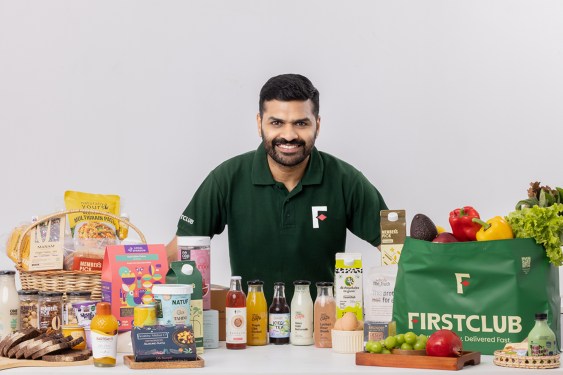While quick commerce in India has become synonymous with 10-minute deliveries, FirstClub is taking a slower and more curated route. Yet just three months after launching its app, the eight-month-old startup has tripled its valuation.
At a post-money valuation of $120 million, the Bengaluru-based startup has raised $23 million in a Series A round co-led by returning investors Accel and RTP Global. The round also saw participation from Blume Founders Fund, 2am VC, Paramark Ventures, and Aditya Birla Ventures. This new funding comes just eight months after FirstClub raised its $8 million seed round at a $40 million valuation in December.
E-commerce in India, the world’s second-largest shopper base, has surged to approximately $60 billion in gross merchandise value and is expected to grow at 18% annually, reaching $170 to $190 billion by 2030. Nearly one in every 10 retail dollars in India is projected to be spent online by the end of the decade. Over the past few months, the market has shifted from traditional e-commerce, where deliveries typically took two to three days, to ultra-fast fulfillment, chiefly driven by the rise of quick-commerce startups. This shift has even prompted incumbents like Amazon and Walmart-owned Flipkart to enter the fray with their own rapid delivery offerings.
However, FirstClub sees a gap. Rather than racing to be the fastest, the startup is betting on quality. It is targeting the top 10% of Indian households, roughly 20 million of them, with premium products and a curated experience. Launched in June, the startup currently serves customers in a few localities of Bengaluru with four dark stores, which it calls clubhouses. Dark stores are fulfillment centers that look like retail stores but serve only online orders. The company stocks over 4,000 curated stock-keeping units from brands across packaged foods, fresh produce, bakery, dairy, and nutrition.
Based on the last three months of data, it is clear that consumers are happy to wait if they are getting a very differentiated selection, good quality products, differentiated service, and a hand-holding sort of experience, said Ayyappan R, founder and CEO of FirstClub. The startup currently sees an average order value of ₹1,050, about twice that of leading quick-commerce platforms for groceries, along with a 60% repeat purchase rate.
The founder hit the ground running with experience under his belt. Before founding FirstClub in December, Ayyappan spent over a decade at Flipkart, India’s largest homegrown e-commerce company, where he led teams at its subsidiaries Myntra and Cleartrip. He was previously part of the team at Indian consumer goods giant ITC, focusing on strategies to expand grocery market and outlet coverage. Those experiences helped him quickly turn FirstClub from a concept into a business. In a span of six months, the company built an end-to-end tech platform.
The startup has also established its own supply chain network and partnered with select brands to offer exclusive products. Currently, 60% of the products on its platform are exclusive. The company does not index on delivery speed, but instead offers products that cannot be found elsewhere, whether offline or online. FirstClub has also hired a third-party consumer panel to test products that will be featured on its platform. For example, 20 products from different brands of paneer are tested by this consumer panel as a blind test, and the top three products get onto the platform.
The startup began its journey with grocery as the first category. It found that while competition is intense in this space, with most quick commerce companies including Blinkit and Swiggy’s Instamart offering groceries, there is room for a differentiated selection of premium-quality items.
FirstClub aims to expand beyond groceries into new categories, including children’s food, pet food, and nutraceuticals. It is venturing into cafes in the next 30 days with a differentiated approach that will not include preheated food but instead freshly made items. The startup also plans to enter the home and general merchandise categories within the next six months. This will include home decor, home essentials, home care, furnishing, and even utensils.
FirstClub’s customer base is 70% women. As a result, the company not only curates products tailored to them but is also expanding into categories most relevant to their needs. The startup’s customers are primarily in the income bracket of ₹1.5 million annual household income. The startup prevents customers from checking out if their cart value is under ₹199 to select the right customers. Further, the app is designed for a browser-led experience rather than a search-led one, which is typical of most quick commerce platforms. This approach encourages users to spend more time exploring options, improving retention and enabling the startup to deliver a curated experience based on customer insights.
The startup has also banned from its supply chain products containing over 200 ingredients that can harm consumers. FirstClub essentially wants to bring the kind of experience that retailers like Costco, Whole Foods, Trader Joe’s, and TJ Maxx offer in North America. The company wants to be present to consumers across multiple channels and multiple platforms, including slotted delivery, subscription delivery, and offline options.
With the fresh funding, the startup also plans to expand its clubhouses to up to 35, covering most of Bengaluru this year, before entering a new city. The company might invite consumers to its clubhouses to showcase how hygienic they are and how quality is maintained. The startup currently has a headcount of 185 employees, including a 75-person operational staff.

